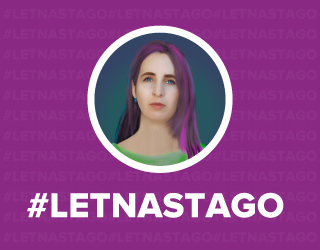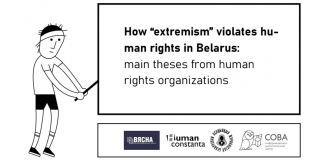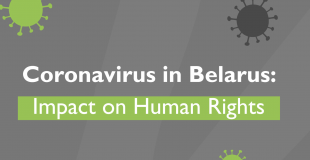Post-Soviet countries are now undergoing a period of adopting and fully integrating human rights. The full-scale war in the center of Europe between Russia and Ukraine makes it necessary to take a new look at international institutions for the protection of these rights. Human rights activist Dmitry Makarov today talked of whether it was possible to seek inspiration in the history and legal design of human rights today. The online lecture was held as part of the week of educational activities “Peace. Equality. Human Rights.”
Содержание
Changes are happening right here and right now
In recent decades, modern society, especially in post-Soviet countries, has been actively trying to comprehend and transform the concept of human rights. Their observance was one of the slogans of the Ukrainian Maidan in 2013. The human rights agenda is more relevant today than ever in Russia and Kazakhstan. It was heard at the protests in Belarus in 2020. In Dmitry’s opinion, the concept of human rights should not be perceived as something that goes back in history. It is being made right here and right now, changing every 15 minutes. This history has not been written yet.
One of the historic steps that occurred after Russia attacked Ukraine in February 2022 was Russia’s withdrawal from the Council of Europe. That means that now Russia is not subject to European rules of protection of rights and freedoms, ordinary citizens will not be able to file complaints with the European Court of Human Rights (ECtHR).
Only the UN protection mechanisms are stillavailable to Russia. Based on the example of Belarus, they have shown their low efficiency. Belarus has not ratified the European Convention for the Protection of Human Rights and Fundamental Freedoms. It is the only European country which is not a member of the Council of Europe. Belarus is a member of the UN, however, no international mechanisms were able to influence the brutal violent suppression of protests after the 2020 elections and the continued strong repression of Belarusian citizens and the opposition for a year and a half. It turns out that the mechanisms created to defend have very little influence on the real situation.
Victors write history, but gradually lose touch with reality
The Universal Declaration of Human Rights is a document that appeared after the horrors of World War II. The whole world suffered. People saw the need to introduce some restrictive mechanisms for all to conduct war and protect lives. The creation of the declaration was one of the unique cases in modern history in which all countries of the world, regardless of their political ambitions, worked for the good of humanity.
The UN is a system that came out of World War II and was created by the victors. The victorious countries are on the UN Security Council, and they have the right to veto any decisions of that body. The world has changed a lot since then. Should these countries have veto power now? The war initiated by Russia against Ukraine brings this to serious consideration. One member of the Security Council is behaving irresponsibly and threatening the world with nuclear war instead of stopping the conflict. But other permanent members of the Security Council in the history of the organization have also abused the veto power to their advantage. China and the United States, for example. This is all a post-war reality, but now we are moving into an after-post-war world. As after World War II, humanity will again face the same dilemma: how to punish absolute evil?
There are boundaries in human rights that no one is allowed to overstep. But those who have a lot of power find it very difficult to limit themselves. The world finds itself in a situation where whoever is stronger and more insolent is right. The law is no longer working, and the modern challenge is to bring it back into force. This is a challenge not only for human rights defenders, but for any people who worry about these aspects. This is something we will have to work with in the coming years. There are examples in the history of the creation of the Universal Declaration of Human Rights to draw inspiration from.
Strong civic engagement
The Universal Declaration of Human Rights emerged as the product of diplomatic arrangements on the one hand and a major civil society movement on the other. Indian politician and social activist Mahatma Gandhi wrote a letter to the UN with his thoughts on the importance of human rights and the peaceful resolution of conflicts. The science fiction writer Herbert Wells created publicistic essays on the subject. In his writings, he emphasizes the need for people of good will in all sectors of society to unite.
Human rights have been a topic of discussion for people of different schools of thought. This is one of the reasons that led states to create the legal instrument that laid the foundation for diplomatic arrangements. These examples show the power of the civil movement. More often than not, history is written by state representatives, but in enshrining human rights a great deal of initiative came from below.
Today it is also possible to witness such a movement from the bottom up. Examples of strong civic solidarity were demonstrated by Belarus during the peaceful protests of 2020 and the subsequent repression. With the outbreak of war in Ukraine, all of Europe is uniting to help refugees from war zones. These foundations can become the basis for further social creativity.
Criticism predicts the future
The creation of a single document posed another challenge to diplomats – how to formulate their ideas so that they would have general significance and be enforced. Delegates from the USSR, who also participated in the drafting of the Universal Declaration of Human Rights, actively criticized the document for not having specific instruments of assurance. This criticism sounded very surprising at the time. The UN covenants and committees for the enforcement of rights emerged ten years later. But now they are showing little effectiveness.
The Latin American delegates, like the Soviet delegates, actively spoke of enshrining economic and social rights. From Latin America this request sounded like part of the preservation of local tribal traditions. From the USSR, it was to divert attention from civil and political freedoms that were unavailable to Soviet citizens. This is an important conversation about how the state can ensure certain minimum standards of living. There is still no agreement or specificity about economic and social rights. What is considered a right to a decent life, to housing? We have yet to talk about this in modern history.
Negotiate with political opponents
Another inspiring example from the history of drafting of the Universal Declaration of Human Rights has to do with the ability to negotiate. For example, Saudi Arabia, a very traditional Muslim country, opposed guarantees to protect women from discrimination. Still, the country did not vote against it, but abstained. Only eight countries, including the USSR, abstained, and the rest voted in favor. The declaration was adopted because no one voted against it.
The Universal Declaration of Human Rights is global. It is accepted by all states and applies to all human beings without exception. The Declaration summarizes rights that are the minimum standard on which it has been possible to agree. It is a unique diplomatic achievement of mankind, and it is now more relevant than ever to return to the history of its writing. There is a war going on in Ukraine, and civilians, including children, are dying. There is a unique opportunity to turn to history and remember how people have managed to agree even in times of great crisis. The old world says that strength determines who is stronger. But people all over the world are showing solidarity: hosting refugees in their homes, talking to each other, thinking about how to deal with the crises of our time together. Despite the pain and suffering, there is much optimism in this phenomenon and attempts to avoid making similar mistakes in the future. To see the full lecture by Dmitry Makarov, please visit our YouTube channel.




